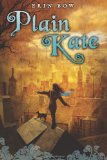by Erin Bow
Arthur A. Levine Books, Scholastic, 2010. 311 pages.
Starred Review
I read this book on a flight from Virginia to California, and I was enchanted. Right from the start, the language drew me in. Here is a passage from the beginning:
“Plain Kate’s father, Piotr, was a wood-carver. He gave Kate a carving knife before most children might be given a spoon. She could whittle before she could walk. When she was still a child, she could carve a rose that strangers would stop to smell, a dragonfly that trout would rise to strike.
“In Kate’s little town of Samilae, people thought that there was magic in a knife. A person who could wield a knife well was, in their eyes, halfway to a witch. So Plain Kate was very small the first time someone spat at her and crooked their fingers.
“Her father sat her down and spoke to her with great seriousness. ‘You are not a witch, Katerina. There is magic in the world, and some of it is wholesome, and some of it is not, but it is a thing that is in the blood, and it is not in yours.
“‘The foolish will always treat you badly, because they think you are not beautiful,’ he said, and she knew this was true. Plain Kate: She was plain as a stick, and thin as a stick, and flat as a stick. She had one eye the color of river mud and one eye the color of the river. Her nose was too long and her bones were too strong. Her father kissed her twice, once above each eyebrow. ‘We cannot help what fools think. But understand, it is your skill with a blade that draws this talk. If you want to give up your carving, you have my blessing.’
“‘I will never give it up,’ she answered.
“And he laughed and called her his Brave Star, and taught her to carve even better.”
Unfortunately, Kate’s father dies when she is still too young to become an apprentice. The guild sends a new carver to run his shop, and Kate ends up sleeping in the bottom drawer of her father’s stall, doing carving for people who are willing to defy the guild for someone who is an expert. Also in her father’s stall, she finds three kittens, and one stays with her, so she has a companion.
But then Kate meets a witch who wants her shadow. He cannot steal it — witchcraft works on the principle of willing exchanges. But he has ways to make sure Kate will want to bargain with him. The people are already suspicious of her, so when he calls fish to her, they are suspicious. He does more magic, until the townsfolk are so convinced she is cursing the town, she knows she has to leave.
The witch takes Kate’s shadow and gives her the true wish of her heart. Losing a shadow, though, is a slow process. Kate joins the Roamers, for awhile, and makes a friend. But will the Roamers keep her after they see she has no shadow? And what about the sleeping sickness that is turning up wherever she goes?
And what did the witch want with her shadow?
I loved this story. It’s a fantasy not quite like any other. There’s a talking cat, and I love the things he says — always perfectly cat-like. Here’s a scene with the cat, Taggle:
“‘Are we finished fleeing?’ the cat asked, the last word swallowed by a huge yawn. He stretched forward, lengthening his back and spreading his toes, then sprang onto the wall beside her. His nose worked. ‘Horses,’ he said. ‘Dogs. Hrrmmmmm. Humans. Chickens. And — ah, another cat! I must go and establish my dominance.’ He leapt off the wall.
“Plain Kate lunged after him. ‘Taggle! Wait!’ She snatched him out of the air by the scruff of his neck.
“‘Yerrrrowww!’ he shouted, hanging from her hand. ‘The insult! The indignity!’
“Kate fell to her knees and bundled the spitting cat against her chest. ‘Taggle!’ she hissed. ‘Stop!’
“‘I shall claw you in a moment, no matter how much I like you. Let me go!’ He writhed against her chest.
“‘Tag, you can’t talk.’
“‘I can talk,’ came the muffled, outraged voice. ‘I can also claw and bite and scra –‘
“‘No,’ she interrupted. ‘You can’t, you mustn’t talk. Listen to me. They’ll kill you if they hear you talk.'”
Kate is up against something very sinister, and she feels responsible, since her shadow is involved. But how can one girl, who doesn’t have magic, stop magic powerful enough to destroy a city? And will she find a place where she belongs?
I thoroughly enjoyed this book. The author said she wrote the first chapter on a plane. Watching the plane’s shadow separate and disappear gave her the idea of losing a shadow.
I’m going to call this Children’s Fiction, rather than Teen Fiction, but I think either group would like this book. The themes are serious, with people dying and Plain Kate living on her own. But she is still a child, too young to be an apprentice, on her own in the big world, with only a cat for a friend.
Find this review on Sonderbooks at: www.sonderbooks.com/Childrens_Fiction/plain_kate.html
Disclosure: I am an Amazon Affiliate, and will earn a small percentage if you order a book on Amazon after clicking through from my site.
Source: This review is based on an uncorrected proof I got at the ALA Annual Conference.
